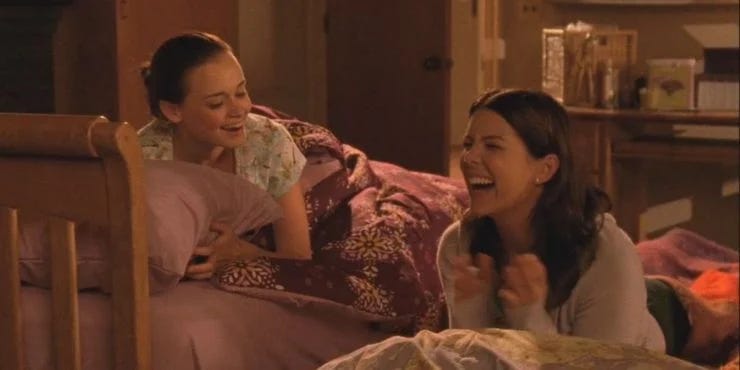BONUS: Part-Time Rory Gilmore
Guest Writer Sarah Greenleaf On How Gilmore Girls gave people the wrong idea about the "Mother/Daughter Best Friends Club"
Welcome to another Gilmore Women bonus newsletter (for paid subscribers)! Thank you so much for your support of this newsletter — it means the world to us that we have found such a community here to give the careful attention to this show that we think it deserves.
Today, we have an extra special treat, an essay from a guest writer: Sarah Greenleaf, a writer and film educator, zine maker, and romance newsletter creator. Sarah discusses how the world saw her own relationship with her single mother through the Gilmore Girls lens, leaving Sarah “very little space for me to actually be.” I hope you love this beautiful meditation on the thorny issues that come with being a real life Part-Time Rory Gilmore as much as we do.
If you are getting this issue, you’re already a paid subscriber. But a Gilmore Women subscription also makes a great holiday gift, circumnavigates supply-chain issues, and avoids putting additional cash into the coffers of the first corporation you probably thought about as soon as you read the word “corporation.” :) — Maggie & Megan

Part-Time Rory Gilmore
By Sarah Greenleaf
When Gilmore Girls first aired I was in seventh grade. My mother and I had recently moved out of my grandparents’ house and into an apartment on our own. We didn’t have a television in that apartment, so my original exposure to the show was entirely secondhand. I noticed that other people went from seeing me and my mother as a broken piece of a nuclear family to viewing us as our own unit. Popularized by Lorelai and Rory we became part of the Mother/Daughter Best Friends Club.
Up until this point, my family arrangement had been so outside the norm that there was no cultural narrative that fit. When I was a child my mother and I lived with my grandparents, 20-something uncle, great aunt, and four dogs. I knew that my family was unusual, but that released me from many of the expectations of the “normal” family. My grandfather attended the ceaseless father/daughter events or I opted out of them entirely. There was no cultural script for this way of living. No one told me a story about these relationships, true or not.
I remember how strange it felt, this new fetishization of my parental relationship that had worked its way into the zeitgeist courtesy of Gilmore Girls.




